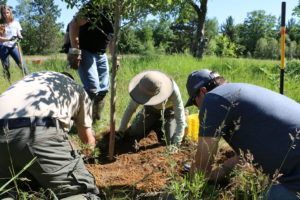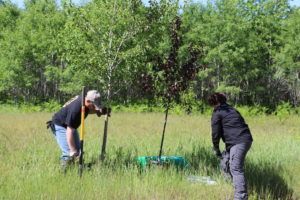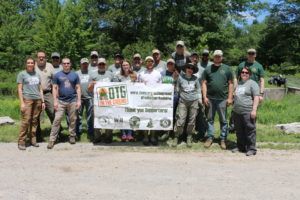OTG Convention Project at Backus Creek State Game Area
On Friday, June 21, a group of 19 volunteers composed of MUCC staff, board members, and affiliate club representatives came out to Backus Creek State Game Area (SGA) to enhance wildlife habitat and kick-off MUCC’s 82nd Annual Convention. After meeting at the DNR Customer Service Center in Roscommon, DNR Wildlife Biologist Mark Boersen led the group to the Backus Creek SGA to get started with the project.
 Upon arrival, Mark introduced the project and the goals for the management of the state game area. Backus Creek SGA is unique in its geography, as it encompasses land with lowland and upland forests, marshes, pine plantations, and grasslands. For this OTG project, our volunteers helped the DNR Wildlife Division support its management plan for the area by maintaining upland forest habitat through the planting of mast-producing tree species. A total of 35 trees containing hawthorn, juneberry, and three different species of crab apple were planted and caged north and south of Backus Creek.
Upon arrival, Mark introduced the project and the goals for the management of the state game area. Backus Creek SGA is unique in its geography, as it encompasses land with lowland and upland forests, marshes, pine plantations, and grasslands. For this OTG project, our volunteers helped the DNR Wildlife Division support its management plan for the area by maintaining upland forest habitat through the planting of mast-producing tree species. A total of 35 trees containing hawthorn, juneberry, and three different species of crab apple were planted and caged north and south of Backus Creek.
To accomplish this, the volunteers split into two groups. One group went to the planting sites north of the creek while the other stayed to the south along the SGA access road, and by the time lunch rolled around at 1:00 P.M. there were only seven trees left to plant on the south side of the creek. Despite the hot conditions, volunteers remained motivated and enthusiastic throughout the course of the project and quickly divided and conquered each task.
other stayed to the south along the SGA access road, and by the time lunch rolled around at 1:00 P.M. there were only seven trees left to plant on the south side of the creek. Despite the hot conditions, volunteers remained motivated and enthusiastic throughout the course of the project and quickly divided and conquered each task.
Mark Boersen was especially pleased with the work completed, stating that what our volunteers accomplished in three hours would have taken him and his staff two weeks to complete with their busy schedules. Our OTG volunteers once again made a positive impact on Michigan’s public lands, this time impacting 30 acres of habitat that will benefit ruffed grouse, wild turkey, white-tailed deer and a variety of other game and non-game species. Projects like this truly capture the power of partnership in conservation.
 Summer 2019 is a very busy time for our OTG program, and we have a wide variety of events for volunteers of any age and with a variety of habitat interests! Whether you want to be on the Red Cedar River at MSU improving aquatic habitat, in the Gladwin State Game Area cutting trees and assembling brush piles for rabbit habitat or in the Pigeon River Country State Forest helping to clear the understory for oak regeneration, OTG is a perfect fit for you. Please visit mucc.org/on-the-ground or email MUCC Habitat Volunteer Coordinator Makhayla LaButte at mlabutte@mucc.org for a full list of projects and more information. Remember, all registered volunteers receive free lunch and a gift!
Summer 2019 is a very busy time for our OTG program, and we have a wide variety of events for volunteers of any age and with a variety of habitat interests! Whether you want to be on the Red Cedar River at MSU improving aquatic habitat, in the Gladwin State Game Area cutting trees and assembling brush piles for rabbit habitat or in the Pigeon River Country State Forest helping to clear the understory for oak regeneration, OTG is a perfect fit for you. Please visit mucc.org/on-the-ground or email MUCC Habitat Volunteer Coordinator Makhayla LaButte at mlabutte@mucc.org for a full list of projects and more information. Remember, all registered volunteers receive free lunch and a gift!
The post OTG Convention Project at Backus Creek State Game Area appeared first on Michigan United Conservation Clubs.
Recent Posts



